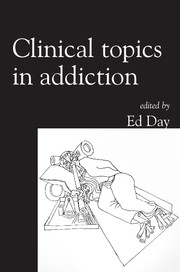Book contents
- Frontmatter
- Contents
- List of tables
- List of boxes
- List of figures
- List of contributors
- Foreword by Nat Wright
- Preface
- 1 What works in drug addiction?
- 2 The development of the drug treatment system in England
- 3 Stimulant use still going strong
- 4 Adverse effects of khat: a review
- 5 What the clinician needs to know about magic mushrooms
- 6 What works in alcohol use disorders?
- 7 Management of alcohol detoxification
- 8 Nicotine addiction and smoking cessation treatments
- 9 Pathological gambling: an overview of assessment and treatment
- 10 Use of investigations in the diagnosis and management of alcohol use disorders
- 11 Laboratory investigations for assessment and management of drug problems
- 12 Pharmacotherapy in dual diagnosis
- 13 Dual diagnosis: management within a psychosocial context
- 14 Treating depression complicated by substance misuse
- 15 Treating anxiety complicated by substance misuse
- 16 An overview of psychological interventions for addictive behaviours
- 17 Motivational interviewing
- 18 Substance misuse in adolescents
- 19 Management of drug misuse in pregnancy
- 20 Intoxication and legal defences
- 21 Substance misuse and violence: the scope and limitations of forensic psychiatry's role
- 22 Literary and biographical perspectives on substance use
- Index
10 - Use of investigations in the diagnosis and management of alcohol use disorders
Published online by Cambridge University Press: 02 January 2018
- Frontmatter
- Contents
- List of tables
- List of boxes
- List of figures
- List of contributors
- Foreword by Nat Wright
- Preface
- 1 What works in drug addiction?
- 2 The development of the drug treatment system in England
- 3 Stimulant use still going strong
- 4 Adverse effects of khat: a review
- 5 What the clinician needs to know about magic mushrooms
- 6 What works in alcohol use disorders?
- 7 Management of alcohol detoxification
- 8 Nicotine addiction and smoking cessation treatments
- 9 Pathological gambling: an overview of assessment and treatment
- 10 Use of investigations in the diagnosis and management of alcohol use disorders
- 11 Laboratory investigations for assessment and management of drug problems
- 12 Pharmacotherapy in dual diagnosis
- 13 Dual diagnosis: management within a psychosocial context
- 14 Treating depression complicated by substance misuse
- 15 Treating anxiety complicated by substance misuse
- 16 An overview of psychological interventions for addictive behaviours
- 17 Motivational interviewing
- 18 Substance misuse in adolescents
- 19 Management of drug misuse in pregnancy
- 20 Intoxication and legal defences
- 21 Substance misuse and violence: the scope and limitations of forensic psychiatry's role
- 22 Literary and biographical perspectives on substance use
- Index
Summary
Summary A number of investigations are available for screening, diagnosing and monitoring people with alcohol use disorders. In research settings standardised alcohol self-report questionnaires perform well. However, in clinical settings haematological and biochemical markers are also used for their objectivity. Single tests on their own cannot be used for accurate diagnosis, and combinations of tests generally are more reliable. The strengths, drawbacks and care required in interpreting established markers, including liver enzymes, serum ethanol concentrations and mean corpuscular volume (MCV), are discussed here. The evidence for newer tests such as carbohydrate-deficient transferring (%CDT), high density lipoproteins, saliva and sweat ethanol measurements are also reviewed.
The purpose of this chapter is to familiarise the reader with the clinical utility of investigations in the diagnosis and management of alcohol use disorders. Many biochemical and haematological tests are widely available, and can improve significantly the quality of diagnosis and management. However, there is no single test that can detect alcohol use disorders with complete accuracy. Further, the validity of a test will vary depending on the clinical application. Such tests should never be relied on in isolation. Adequate clinical evaluation also needs to include a combination of interview and examination of the patient, and interview of other informants (Cantwell & Chick, 1994). In the research setting, self-report is generally a valid and reliable method of assessing alcohol consumption (Babor et al, 1987), particularly when it is elicited by a standardised method (e.g. Sobell et al, 1980) and the information is provided in confidence. In the clinical setting, however, the patient may report his or her version of past drinking to fit the situation, particularly if adverse consequences are likely to ensue (e.g. discharge from a treatment programme). Combinations of tests are likely to be more reliable than individual tests.
We are not concerned here with the full gamut of examinations available to investigate physical and psychiatric disorders associated with alcohol misuse. Rather, our review is intended to provide up-to-date information on biochemical and haematological markers of excessive drinking, and their application in clinical diagnosis and management.
Purpose of investigations
The choice and application of a test will depend on its purpose and the setting in which it will be used.
- Type
- Chapter
- Information
- Clinical Topics in Addiction , pp. 113 - 129Publisher: Royal College of PsychiatristsPrint publication year: 2007

